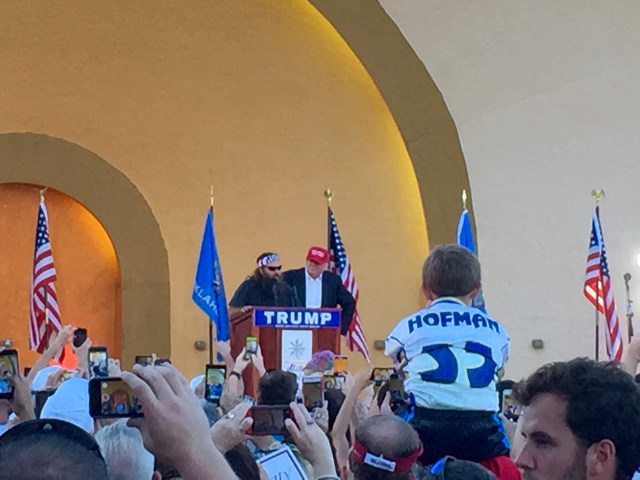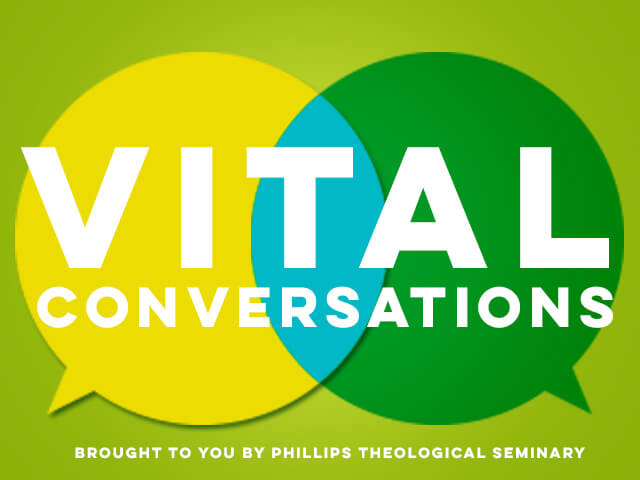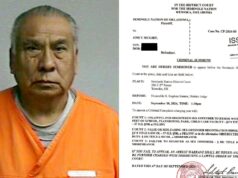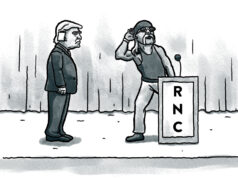

(Editor’s Note: Vital Conversations is a running series of commentaries from various faith leaders. The series is sponsored by Phillips Theological Seminary, though contributions come from theologians who are unassociated with the seminary. To submit work for Vital Conversations, simply email Editorial@NonDoc.com.)
The Republican establishment is now seriously wringing its hands over the ascendancy of Donald Trump’s candidacy.
The core problem for the party is that the very audiences whose support Republicans need to win the general election are the very audiences that Trump dismisses with full-throated vigor. And he’s winning.
A recent Tom Toles political cartoon captures the dilemma well. Two elephants (Republicans) are talking with one another. The first says, “We’ve got a Trump problem.” To which the other responds, “He’s appealing to voters who are responding to racism bordering on fascism.” The first says, “It’s a real dilemma,” with the other asking a concluding question, “How do we get rid of Trump but keep those voters?”
As the cartoon brilliantly illustrates, what Republicans have yet to own, but cannot do so publicly, is that Donald Trump is not the real problem. The real problem is the audience they have created and catered to during the last 50 years.
What the Republican establishment knows is that if it cannot make stronger appeals to women, blacks and Hispanics, they will surely lose the national election in 2016. Yet many of their rank and file loyal foot soldiers (who will surely vote, at least in the primaries) find these very shifts anathema and a betrayal to the religious/political ideology of the past 50 years.
It was, after all, in national campaigns that the Republican establishment lurched to the cultural right to forge a coalition of free-market conservatives and social/religious conservatives.
Here, I especially want to call attention to the religious dimensions of this coalition. Fundamentalist/evangelical Christians have been at the heart of this ideology of “traditional values” and “American exceptionalism.” And it is this very coalition that is now so troubling in the case of Donald Trump.
While the establishment Republican candidates — realizing the need to change their discourse — have sought to back away from the religious/political ideology of the past 50 years, Trump has essentially walked into the campaign and said, in effect, “If you don’t want that audience, I do.”
And from bringing out his Bible and talking about how much he respects it, to appealing to every jingoistic impulse in conservative Christian America, Trump has made the other candidates appear timid, weak and fearful.
After all, those candidates seem to be avoiding the Republican core constituency. What of those candidates’ loyalty to the bonds the party had nurtured, Trump might well ask?
In the current election cycle, the Republican establishment has left itself open to the charge that they have forgotten their commitments. And virtually on cue, at least since a Sept. 15 speech and perhaps earlier, Trump has returned to an old favorite line of Richard Nixon’s — the “silent majority.”
What has, in recent days, become far more troublesome is that Trump is now appealing to that same conservative Christian audience about the threat of Islamic terror. He is using the terrorist attack carried out in San Bernardino, Calif., that killed 14 people to move the focus of his “us vs. them” campaign from illegal immigrants to Muslims.
Warning his South Carolina audience, “It’s going to get worse. It’s going to get a lot worse,” Trump offers himself as the only candidate who is telling the truth, even as he tells his fundamentalist Christian audience what they want to hear.
His strong solution? A religious test for entry into America — preventing all Muslims from legally entering the country “until we find out what’s going on.” Blithely unconcerned about the potential of stoking the flames of a global religious war, Trump plays the man of principle.
While policy personnel in both parties have sounded the alarm that such rhetoric plays into the hands of ISIS propaganda, Trump’s political position seems strengthened for the moment.
Time will tell if the outrage from both parties slows his momentum.
But if party officials thought Trump was going to go away quietly, this new opportunity to be the strongest voice for “the people,” as Trump says, for America’s “silent majority,” will make him a serious contender in most if not all Republican primaries. And in this perfect storm, the Republican establishment has only itself to blame.
To be sure, the political use of Christian faith to combat “godless” communism in the Cold War opened the door to this kind of rhetoric.
Harry Truman, in his Inaugural address of 1949, did not quote the second paragraph of the Declaration of Independence (“We hold these truths to be self evident, that all men are created equal”) but the book of Genesis, in that “all men are created in the image of God.”
He used that text to help create the religious/political ideology of a god-fearing America at war with godless communism.
It was a powerful bond, leading not only to abuses of McCarthyism and its witch hunts but also later to religious conservatives’ sense of abandonment, railing against “that godless court” in response to Supreme Court decisions against school prayer and Bible reading in public schools in the mid-1960s and the decision of Roe v. Wade in 1973.
So, the underlying cultural problems have been there for decades, but the Republican decision to tap into that religious/cultural resentment and to encourage its anti-intellectualism and its bigotries for their own short-run political gains has been disastrous for public policy — in many cases, leading to the intellectual and cultural gridlock that we find today in Congress.
Here are the highlights of the Republican appeal to conservative evangelical and fundamentalist Christians.
- Richard Nixon picks up the “Southern strategy” from the Democrats following the passage of the Civil Rights Act of 1964, appealing to structures of white supremacy, themselves rooted in a language of Christian purity.
- Ronald Reagan makes common cause with Paul Weyrich and Jerry Falwell’s freshly minted political action group Moral Majority in 1979, which delivered two-thirds of evangelical voters and many urban Catholic pro-life voters to Reagan;
- When, with Reagan’s backing, the Fairness Doctrine was repealed, Rush Limbaugh launched his national radio show in 1988, attacking “liberals” and “feminazis” on the airwaves and forging a populist, political/religious consensus with comments like this from 2013: “If you believe in God you cannot intellectually believe in man-made global warming.”
- Pat Robertson launches a voter-mobilization organization called the Christian Coalition in 1989, which would become the Christian Coalition of America, among the most powerful political organizations in the country;
- Throughout the 1990s Republicans played off of the 1991 book Culture Wars by James Davison Hunter.
- See Pat Buchanan’s 1992 speech at the Republican National Convention: “The agenda that Clinton & Clinton would impose on America: abortion on demand, a litmus test for the Supreme Court, homosexual rights, discrimination against religious schools, women in combat units. That’s change, all right. But that’s not the kind of change America needs. It’s not the kind of change America wants. And it’s not the kind of change we can abide in a nation we still call ‘God’s country.’”
- See Charlton Heston’s speeches in the late 1990s as President of the National Rifle Association, like this one from 1997: “I believe that we are again engaged in a great civil war, a cultural war that’s about to hijack your birthright to think and say what resides in your heart.” And another from 1999, entitled How to Win the Culture War.
- Rupert Murdoch founds Fox News as “an alternative to CNN” in the fall of 1996 and installs Republican political operative Roger Ailes as CEO.
- President George W. Bush authorizes Karl Rove to put amendments on the ballots of 11 states to ban “gay marriage” in the 2004 election to increase voter turnout against John Kerry.
- President George W. Bush says in 2005 that “Intelligent Design” should be taught in public schools so that “people can understand what the debate [with evolution] is about.”
- In 2011-12, Republicans, with the help of the Koch Brothers and the Tea Party, seek to repress the vote, especially in 38 states, to defeat President Obama in the 2012 national election.
And such a list does not begin to scratch the surface of an intentional program to link the Republican Party with the interests of conservative evangelicals and fundamentalist Christians.
I can certainly understand why political pundits of both parties do not want to speak directly about this conservative Christian component of recent Republican ideology for fear of the way it could inflame the violent, apocalyptic mentality of many within that fundamentalist audience — fueling the very message and tactics ISIS uses.
However, if we fail to name the problem that Republican strategists for the last two generations have created by their appeals to Christian fundamentalists, then we fail to see the real problem facing the nation, with or without Donald Trump.
Previous installments of Vital Conversations
With Jesus born, Mary would have been uninsured in OK
Faith community dialogue: Criminal justice reform
Save persecution label for when liberty is endangered
Science, religion agree: ‘We are part of nature’
Ten Commandments: Reactions spur moral discussion
Vital Conversations: Christianity needs a Jon Stewart
Imam: A Muslim is your brother from another mother
Pope’s visit should ‘enrich our impoverished discourse’
Vital Conversations: Truth seekers can lose arguments
‘Vital Conversations’ help spiritual minds






















